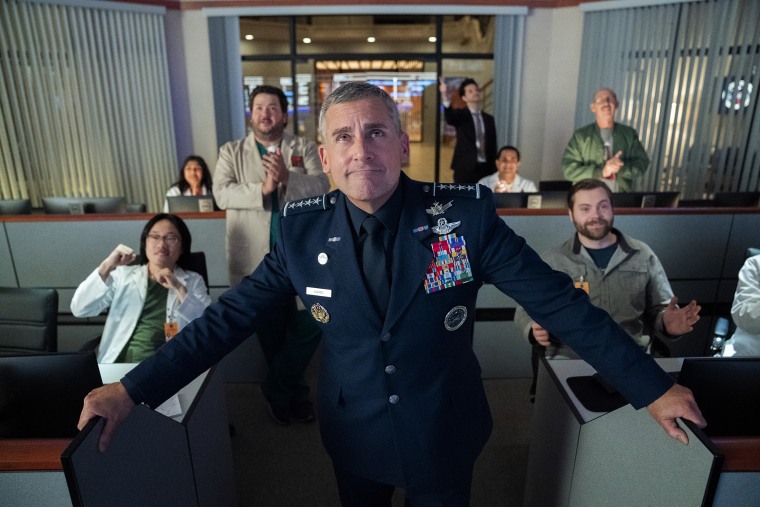The new Netflix series "Space Force" is a gentle, heartwarming comedy about our current political situation. Unfortunately, gentle, heartwarming comedies about our current political situation seem at best irrelevant and at worst immoral.
The show stars Steve Carell as Gen. Mark R. Naird, a career military officer promoted to lead Space Force, a new branch of the service dedicated to the defense and militarization of space. President Donald Trump actually created a Space Force at the end of 2019, and the series pokes occasional fun at the (unnamed) president's petulance and un-spellchecked tweets. (He calls for "boobs on the moon," but they're pretty sure he means "boots on the moon.")
Most of the plot, though, focuses on Naird's relationship with his chief scientist, Adrian Mallory (John Malkovich), as they try to get Space Force's satellites and crewed space station up and running. Off to the side, Naird's demanding job puts a strain on his relationship with his daughter, Erin (Diana Silvers), and his incarcerated wife, Maggie (Lisa Kudrow).
Mark and Maggie's negotiation of their relationship is the best part of the series by far, and it makes you wish the show had focused on the family rather than the job. But workplace comedies are Carell's forte; he is best known for his portrayal of Michael Scott, the painfully self-absorbed and incompetent boss on "The Office." Carell's version of the character was notably more sympathetic than that of his counterpart, Ricky Gervais, in the U.K. version. "Space Force" takes that a step further. Gen. Mark Naird is Michael if Michael were good at his job and had a heart of gold. "You literally couldn't do the wrong thing," one character tells him.
Mark still has flashes of Michael's cringeworthy awkwardness; he blusters and fumbles conversations and doesn't understand social media. But the show quickly settles into a familiar sitcom formula, in which Mark is presented with practical and moral challenges that he resolves at the end of a half-hour because he's a good leader and a good person.
Mark, as a fundamentally decent person, is able to mitigate the worst excesses of an ignorant POTUS and a reckless administration, who want to rush into space and amp up conflict with the Chinese. Thanks to the stewardship and conscience of one good man, no one dies in "Space Force" because of cutting corners, corruption or saber rattling. In the real world, Trump's crisis mismanagement of the coronavirus crisis alone has led to tens of thousands of unnecessary deaths.
Worse, "Space Force" often goes beyond minimizing to something closer to endorsing. Trump's idea for a space force was itself ill-conceived, expensive and potentially dangerous. But Mark's in charge of the new military branch, and we like Mark, so we end up rooting for the institution. One episode is even dedicated to defending military waste.
The show's most pointed satire is reserved not for Trump but for leftist Rep. Alexandria Ocasio-Cortez, D-N.Y. Her thinly veiled stand-in is presented as foolish for daring to care about her working-class constituents. The character is referred to as the "angry young congresswoman." No one on the show acknowledges that calling women of color "angry" is a common racist stereotype.
Mark and other characters also repeatedly question the loyalty and Americanness of one of the scientists, Dr. Chan Kaifang (Jimmy O. Yang), because he is Chinese American. This feels particularly tone-deaf during the coronavirus pandemic, when right-wing scapegoating of China has led to a spike in hate crimes against Asian Americans. But in "Space Force," Mark's anti-Asian racism is treated as just another goofy quirk. It's even validated when the commander's judgment about a rocket launch turns out to be right and Chan's turns out to be wrong — even though Chan is the one with the actual scientific expertise. In the real world, bigotry has compounded federal incompetence and contributed to violence and harm. In "Space Force," Mark's prejudice is congruent with mission success.
In the real world, bigotry has compounded federal incompetence and contributed to violence and harm. In "Space Force," Mark's prejudice is congruent with mission success.
"Space Force's" acquiescence to the status quo is especially vivid because there's another superficially similar series that is a lot less toothless. HBO's "Avenue 5" is a space-themed workplace sitcom featuring another beloved comic actor (Hugh Laurie, in this case).
But "Avenue 5" is a bleakly hilarious parable about how incompetent, callous leadership will murder us all. The season starts with a luxury space cruiser going off course, and soon dead bodies are in orbit around the ship. Conspiracy theories lead passengers to literally kill themselves, evoking current anti-lockdown protests in which conservatives demand increased exposure to a deadly virus. The series doesn't allude to Trump as directly as "Space Force" does, but its last episodes, especially, are nauseatingly prescient. Leaders thrash and boast uselessly as corpses pile up and the ship sets an ever more certain course for misery and catastrophe.
"Space Force" ends on a cliffhanger, too. But it's the sort of show where you know everything is going to be all right in the end. Mark's in charge, he's a good guy, and somehow he, like America, will work things out. It's a comforting message. But it's not an especially convincing one. And as Trump has proven again and again during the COVID-19 crisis, a comforting message without truth is no comfort at all.

